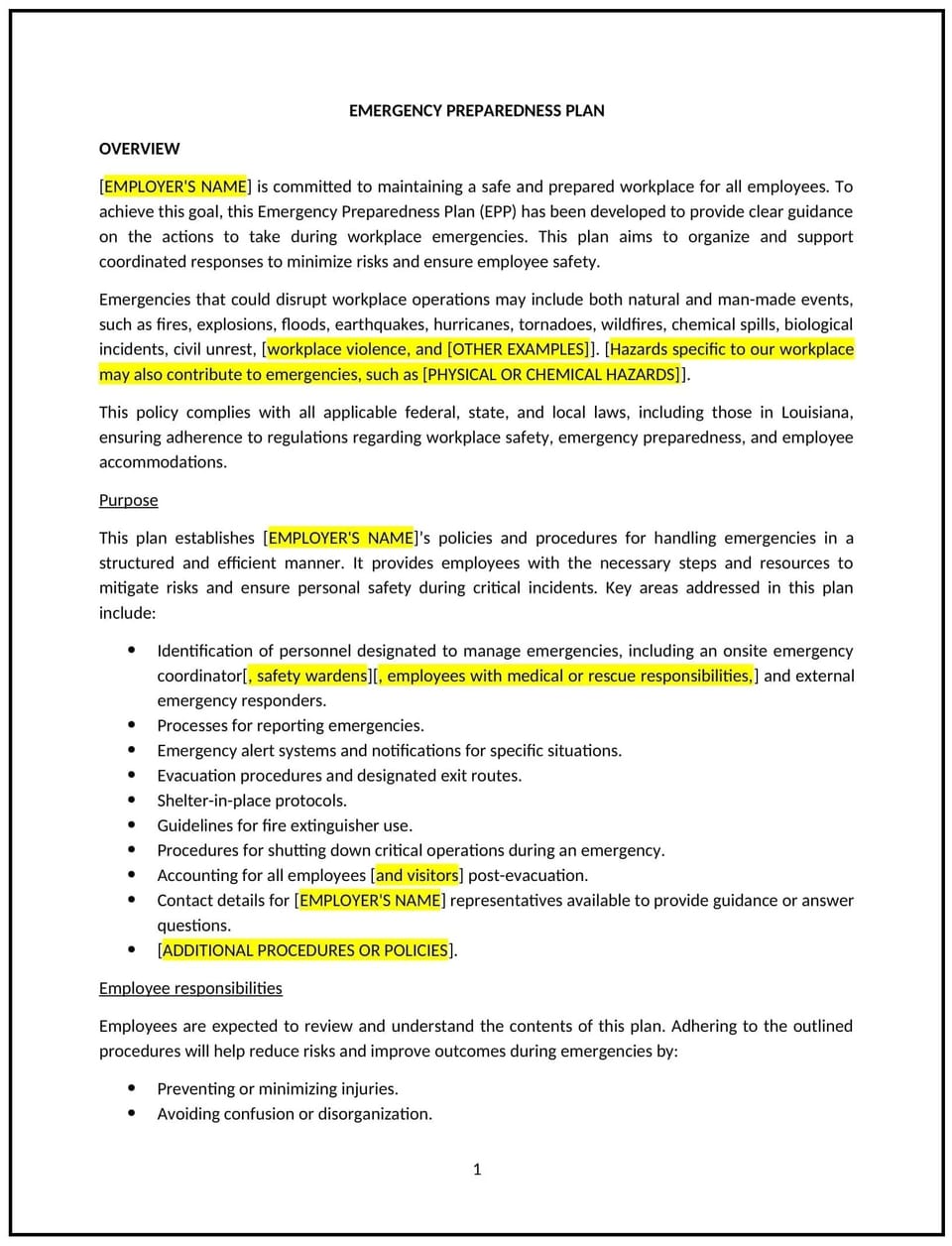Emergency preparedness plan (Louisiana): Free template

Emergency preparedness plan (Louisiana)
This emergency preparedness plan is designed to help Louisiana businesses establish clear procedures for responding to emergencies such as natural disasters, workplace accidents, or other critical events. It outlines roles, responsibilities, and protocols to protect employees, minimize disruption, and ensure business continuity.
By implementing this plan, businesses can enhance safety, improve response times, and foster resilience in the face of emergencies.
How to use this emergency preparedness plan (Louisiana)
- Identify potential risks: Assess the types of emergencies most relevant to Louisiana, such as hurricanes, floods, or power outages.
- Define roles and responsibilities: Assign specific tasks to employees or teams, such as evacuation leaders or communication coordinators.
- Establish communication protocols: Outline how emergency information will be communicated to employees, clients, and stakeholders.
- Develop evacuation procedures: Provide detailed steps for safely evacuating the workplace, including designated exits and assembly points.
- Include emergency supplies: Ensure the workplace is equipped with emergency kits, such as first aid supplies, flashlights, and non-perishable food.
- Plan for business continuity: Include strategies for maintaining critical operations during and after an emergency.
Benefits of using an emergency preparedness plan (Louisiana)
Implementing this plan provides several advantages for Louisiana businesses:
- Enhances employee safety: Reduces risks and protects employees during emergencies.
- Minimizes operational disruption: Ensures a faster recovery and continuity of business activities.
- Clarifies responsibilities: Provides a structured framework for responding to crises effectively.
- Builds trust: Demonstrates a commitment to employee well-being and stakeholder confidence.
- Reflects Louisiana-specific risks: Addresses local hazards, such as hurricanes or flooding, to create a more tailored response.
Tips for using this emergency preparedness plan (Louisiana)
- Conduct regular drills: Schedule practice drills to familiarize employees with evacuation routes and emergency procedures.
- Train employees: Provide training on emergency response roles, such as first aid or fire safety.
- Update contact information: Keep an up-to-date list of emergency contacts for employees, vendors, and local authorities.
- Secure important documents: Store critical business records digitally and in offsite backups to protect against damage.
- Review plan annually: Regularly assess and update the plan to address new risks or operational changes.
Q: What types of emergencies should this plan address?
A: The plan should cover emergencies such as hurricanes, floods, fires, workplace accidents, and power outages, tailored to Louisiana’s specific risks.
Q: Who is responsible for managing emergency preparedness?
A: Businesses should designate an emergency coordinator or team responsible for overseeing preparedness and response efforts.
Q: How can businesses communicate during an emergency?
A: Businesses should establish communication protocols, such as phone trees, email alerts, or text notifications, to quickly share updates with employees.
Q: What should be included in workplace emergency kits?
A: Emergency kits should contain first aid supplies, flashlights, batteries, water, non-perishable food, and other essentials for immediate needs.
Q: How can businesses prepare for hurricanes or floods?
A: Businesses can create evacuation plans, secure valuable equipment, and establish backup systems to minimize the impact of these events.
Q: How often should this plan be reviewed or updated?
A: The plan should be reviewed annually or after significant changes, such as new locations, staff, or risks.
Q: What steps can businesses take to ensure business continuity?
A: Businesses can identify critical operations, implement remote work solutions, and establish relationships with alternative suppliers or partners to maintain operations.
This article contains general legal information and does not contain legal advice. Cobrief is not a law firm or a substitute for an attorney or law firm. The law is complex and changes often. For legal advice, please ask a lawyer.


